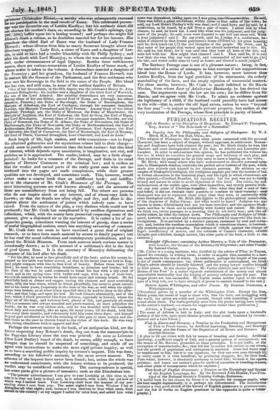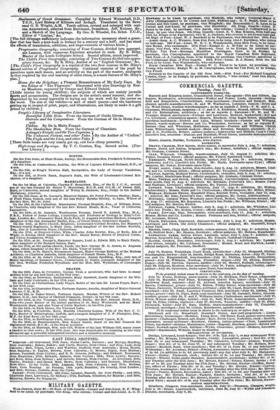• PERLICATIONS. REDEIVED.
Life in Russia; or the Discipline of Despotism. By Edward,P, Thompson, Esq., Author of " The Note-book-4sta Naturalise'
An Inquiry into the Philosophy and -Religion ottShakspero, By W. J. Birch, M.A. New Inn Hall, Oxon., &e..- [Vie religion of Shakepere, like many other points connected with his personal character, has been a subject of dispute, without approach to settlement. Roman- ists and Anglicans have both claimed the poet; but Mr. Birch. thinks he was, like Marlowe and some distinguiehed men of his day, an Atheist and Lucretian phi- losopher. In order to substantiate this opinion, he has published the volume be- fore us; in which he considers the general scope and tendency of each play, and then examines -its passages so far as they seem to have a bearing on his views.
Mi. Birch, with many others who have endeavoured to discover personal °pis.- ions in Shaksperels dramas; overlooks the perfect artorinittinotof the poet, whiuli made him entirely sink himself in his dramatis personae. He adduces as ex- amples of Shakspere'sirreligion, the irreligious appeals put into the mouths of bad. or violent characters in-the historical plays, and the-light in which churchmen are often painted,—Cardinal Beaufort, for example: but the poet was not to falsify, history and nature in order to avoid objections of this kind. The rulers, lay and ecclesiastical, of the middle ages, were often hypocrites, and mostly persons with- out any tree- sense of Christian:humility ; even when they had a sort of -few malbelief, it did not restrain ,their- paseions or condom to their veracity: Shakspere was not to represent them other. than they were, in conformity "Atli` some theological notiom Mr Birch iitio4blijiicts to the philosophical matenalient., of' the character of Julius Ctesar: but what would he have? Judaism wa. niqjs. known to-thorn;. Christianity-had not yet been revealed; and the opinions Shale- spare 'ascribes. to -them arein conformity with history and'record. Mr. Birchs4 we think too, twists passages to a meaning they do not fairly bear; and, like nal hobby-riders, he rides his-subject- down. The Philosophy and 'Religion of Shah. spere, however, is a curious and even an-attractive book for those who like such in- vestigations. It-is pervaded, by a distinct purpose, sustained by zeal,and-indeses try; and, besides the needless,roaterialiam which it sometimes tmees,. itineident- ally oontainseomezood-remarks. The- defeece of Othello against. tee ehiarge 4)0 Iago's insufficiency of motive' and the -estimate of. Cassids character, exiabitA thought and criticism, though carried, like other parts of the book, a little to the. extreme.] MitinigAs,Efusionst containing Arthur Mervyn; a Tale of the Peasantry; with London; the Groans of the Britons; the-Shipwreck; and other Poems; By 'Samna Carter. [Mr. Carter is a youog .barrister, who, fortified by the advice of Pliny to Tuscan, passed his evenings in writing verge, in order to acquire that essential to is law-, yer, readinesein the use of words. As exercises, perhaps the length of the poem is not of much 'consNuenee; but where publication is contemplated, we thinks Pliny's advice should be literally followed, and the young lawyer confine himself to little pieces. In the shorter poems, Mr. Carter exhibits ease and force: "The Homes of the Poor" is a rather vigorous embodiment of the misery and almost unavoidable immorality that the lodging of poverty enforces upon the poor. The. longer pieces are less successful Mr. Carter seems neither equal to the struo- turn of a long tale, nor to have strength of pinion to sustain himself to the end.] Return Again Whittington, and other Poems. By Dunstan Dormouse, a
Whittingtanian. [Occasional poems by a member of the Whittington Club. Except. the first, which points the moral of hope to those who like the hero, are struggling with the world, the pieces are crude and juvenile; though with something of neediest' sound about them. Thelaults probably arise from the poems having been written in'the author's boyhood, —a semen for suppression rather than publication.]
Adrian; a Tragedy, in five acts. The scene of Adrian is laid in Italy; and the. 'plot turns upon a hasband'e jealousy of his wife, upon more slender grounds than usual, fomented by circuit,- stances and a false friend.] Fisk in Rivers and Streams; a Treatise on the Production and Management of Fish in Fresh-waters, by Artificial Spawning, Breeding, and liearrnjr showing also the Cause of the Depletion of all Rivers and Streams. Gottlieb Boccius.
[A plan to fill our rivers with fish by means of breeding and feeding. Artificial:- spawning, a sufficient supply of food, and a general system of management, are the means of Mr. Boccius grounded on these principles. It is not traffio, or the corruption of manufacbaries, &o., that bid fair to render fish extinct in our riversi.
but the growth of population and corruption in mankind. Some bad water nuryo be-unpleasant to fish, butit is not injurious, for they can soon pass through itri
in many cases 'it is even beneficial, by producing maggots, &c., for their food:: Pure water, however, is absolutely necessary to breed fish; without it the spews. perishes: and hence our author's plan for artificial nurseries or breeding-waterer' and-other plans of management which he explains.]
Text-book of English Grammar; a Treatise on the Etymologyand Sjalat - of the English Language, &e. By the Reverend John Hunter, Vice-Pun.. cipal of, the National-Society's Training College-, Battersea. [A useful book for the classes for whom it is designed: for younger pupils, whew are-best-taughtdogroatically, it is perhaps-too ratiocinative. The introduction- contains a very good sketch debts history of English grammars or grammarians; and the list of works on- Eaglish grammar. in the appendix is quite &dial/in. grepity.)* Rudiments of Greek Grammar. Compiled by Edward Wettenhall, Dl)., T.C.D., Lord Bishop of Kilmore and Ardagh. Translated by the Reve- rend G. N. Wright, A.M. Tenth edition, revised and enlarged with copi- ous Annotations, selected from Buttmann, Donaldson, Jelf, Kuhner, &c., and a Sketch of the Language. By Geo. B. Wheeler, Ex. Schol. T.C.D., Editor of " Lucian " &c.
[The ftill titlepage sufficiently indicates the information necessary about a gram- mar that has been a text-book in Ireland for a century and a half; and has stood the effects of translation, additions, and improvements of various kinds.] Progressive Geography; consisting of Four Courses, divided into appropri-
ate Lessons, with numerous Exercises attached to each. By R. Riley,
Master of the Leeds Collegiate School. Second edition, much improved. The Child's First Geography; consisting of Two Courses divided into appro- priate lessons, &c. By R. Riley, Author of an " English Grammar," &e. [The Child's First Geography is a reprint of the two first courses in Mr. Riley's Second edition of Progressive Geography. Continual exercise of the pupil by questions upon each lesson, and an activity on the part of the master, analogous to that required by the oral teaching of olden times, is a main feature of Mr. Riley's plan.] Home for the Holidays; a Pleasant Remembrance of My Early Days. By the Editor of "The Playmate." Illustrated with nine Drawings by Ken- ny Meadows; engraved by George and Edward Dalziel. [Little stories for young children; the subjects of which are mainly juvenile sports and amusements. The designs are in the artist's usual manner, and dis- tinguished by his usual ingenuity in laying out the work well for the carver on the wood. The size of the volume-a sort of small quarto-and the handsome getting-up in respect of print, paper, and illustrations, are likely to make it a gift prized by children.]
People's Library of Imaginative Literature.
Beautiful Little Rose. From the German of Guido Ganes. Sintram and his Companions. From the German of De la Motte lon- gue.
rfnditie. By De la Motto longue.
The Shadowless Man. From the German of Chamisso.
Aslaug s Knight, and the Two Captains.
The Unknown Patient, and other Tales. By the Author of "Caine." The Eagle and the Lion, and other Tales
[These little books are very neatly got up, and form cheap presents.]
High-ways and By-ways. By T. C. Grattan, Esq. Second series. (Par- lour Library.)



























 Previous page
Previous page